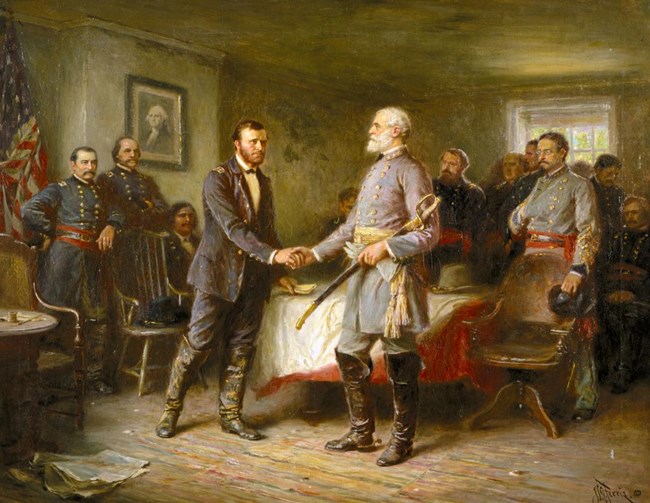Authors:
Historic Era: Era 5: Civil War and Reconstruction (1850-1877)
Historic Theme:
Subject:
Winter 2010 | Volume 59, Issue 4


Authors:
Historic Era: Era 5: Civil War and Reconstruction (1850-1877)
Historic Theme:
Subject:
Winter 2010 | Volume 59, Issue 4

As April 1865 neared, an exhausted Abraham Lincoln met with his two top generals, Ulysses S. Grant and William Tecumseh Sherman, to discuss the end of the Civil War, which finally seemed to be within reach. Nevertheless, the president—“having seen enough of the horrors of war”—remained deeply conflicted. To be sure, the endless sound of muddy boots tramping across City Point, Virginia, and the heavy ruts left by cannon wheels marked Grant’s preparations for a final all-out push to ensnare the Army of Northern Virginia. Yet Lincoln could not shake off his deep-seated fears that Robert E. Lee would somehow escape Grant’s clutches or, worse still, that his worn but still formidable forces would melt into the western mountains to continue the war indefinitely as marauding guerrilla bands. Nor was this idle speculation. Lee himself had once boasted that if he could get his army into the Blue Ridge Mountains, he could continue the war for another “20 years.”
Grant himself shared Lincoln’s foreboding, later confessing, “I was afraid every morning that I would awake from my sleep to hear that Lee had gone . . . and the war was prolonged.” At one point during their final meeting at City Point, a morose Lincoln pleaded, “My God! Can’t you spare more effusions of blood? We have had so much of it.” Indeed, what most haunted him now was the belief that the war might end only after some final mass slaughter, or that it would dwindle into a long twilight of barbarism or mindless retaliation, as had happened in so many other civil wars, thus unleashing an endless cycle of more bloodshed and national division. To reunite the country, Lincoln believed the conflict’s close must be marked by something profoundly different: a spirit of reconciliation.
But after four years of bloodletting, could it? Distressingly, on the fateful morning of April 9, 1865, the decision ironically seemed to be more in Lee’s hands than in Lincoln’s. When the first glimmer of sun broke around 5 a.m., Lee’s vaunted army was at last surrounded, and the aging general now faced a decision that would forever shape the nation’s history.
With gunfire still rattling in the distance, Lee convened a council of war. The talk turned to surrender, whereupon one of Lee’s top aides protested that “a little more blood more or less now makes no difference.” Instead he suggested that the Confederates play the trump card that Lincoln most dreaded and dissolve into the hills as guerrillas. As Lee carefully listened, he knew that this option was not lightly to be ignored. Just days earlier, the fleeing Confederate president, Jefferson Davis, had issued his own call for guerrilla struggle. And hundreds of Lee’s men had already vanished into the countryside on their own initiative, anticipating precisely